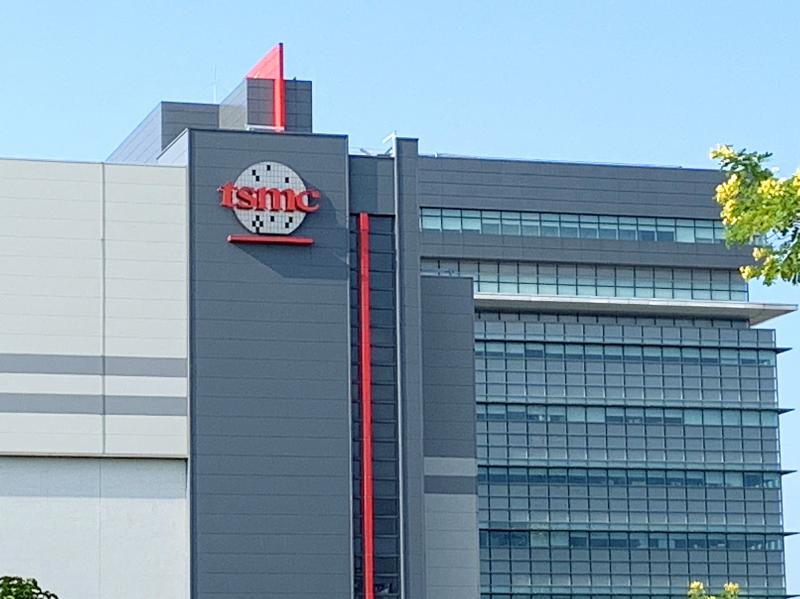Taiwan Semiconductor Manufacturing Co (TSMC, 台積電) is reportedly planning to tighten customers’ payment terms next year to better manage its cash flow and fund its capital spending.
The Hsinchu-based chipmaker plans to ask customers to pay within 15 days of receiving chips from TSMC, compared with its current practice of 30 days, the Chinese-language Liberty Times (the Taipei Times’ sister newspaper) reported yesterday, citing sources from firms in semiconductor supply chains.
The new payment terms are to take effect next year, the newspaper said.

Photo: Grace Hung, Taipei Times
TSMC counts Apple Inc, Advanced Micro Devices Inc, Nvidia Corp and MediaTek Inc (聯發科) among its major customers.
To capture rapidly growing demand, TSMC might spend more than US$40 billion on capital expenditure next year, following a record budget of US$40 billion to US$44 billion this year, company chairman Mark Liu (劉德音) told shareholders in Hsinchu last week.
Such huge capital spending is reducing the chipmaker’s free cash flow, Liu said.
The massive investment is aimed at boosting revenue growth in the next few years, as TSMC expects it to accelerate to an annual rate of 30 percent this year, up from 24.9 percent last year, Liu said.
In the first quarter, TSMC saw its free cash flow fall 22.85 percent to NT$110.04 billion (US$3.7 billion), compared with NT$142.64 billion a quarter earlier, the firm said in a financial statement.
That is the lowest figure in about three quarters.
TSMC also told customers that it planned to increase prices on new orders by 10 percent next year, the Liberty Times said.
The chipmaker has reportedly raised chip prices several times due to surges in manufacturing costs and a prolonged chip crunch.
TSMC said in an e-mail to the Taipei Times that it does “not comment on such questions.”

‘SWASTICAR’: Tesla CEO Elon Musk’s close association with Donald Trump has prompted opponents to brand him a ‘Nazi’ and resulted in a dramatic drop in sales Demonstrators descended on Tesla Inc dealerships across the US, and in Europe and Canada on Saturday to protest company chief Elon Musk, who has amassed extraordinary power as a top adviser to US President Donald Trump. Waving signs with messages such as “Musk is stealing our money” and “Reclaim our country,” the protests largely took place peacefully following fiery episodes of vandalism on Tesla vehicles, dealerships and other facilities in recent weeks that US officials have denounced as terrorism. Hundreds rallied on Saturday outside the Tesla dealership in Manhattan. Some blasted Musk, the world’s richest man, while others demanded the shuttering of his

ADVERSARIES: The new list includes 11 entities in China and one in Taiwan, which is a local branch of Chinese cloud computing firm Inspur Group The US added dozens of entities to a trade blacklist on Tuesday, the US Department of Commerce said, in part to disrupt Beijing’s artificial intelligence (AI) and advanced computing capabilities. The action affects 80 entities from countries including China, the United Arab Emirates and Iran, with the commerce department citing their “activities contrary to US national security and foreign policy.” Those added to the “entity list” are restricted from obtaining US items and technologies without government authorization. “We will not allow adversaries to exploit American technology to bolster their own militaries and threaten American lives,” US Secretary of Commerce Howard Lutnick said. The entities

Minister of Finance Chuang Tsui-yun (莊翠雲) yesterday told lawmakers that she “would not speculate,” but a “response plan” has been prepared in case Taiwan is targeted by US President Donald Trump’s reciprocal tariffs, which are to be announced on Wednesday next week. The Trump administration, including US Secretary of the Treasury Scott Bessent, has said that much of the proposed reciprocal tariffs would focus on the 15 countries that have the highest trade surpluses with the US. Bessent has referred to those countries as the “dirty 15,” but has not named them. Last year, Taiwan’s US$73.9 billion trade surplus with the US

Prices of gasoline and diesel products at domestic gas stations are to fall NT$0.2 and NT$0.1 per liter respectively this week, even though international crude oil prices rose last week, CPC Corp, Taiwan (台灣中油) and Formosa Petrochemical Corp (台塑石化) said yesterday. International crude oil prices continued rising last week, as the US Energy Information Administration reported a larger-than-expected drop in US commercial crude oil inventories, CPC said in a statement. Based on the company’s floating oil price formula, the cost of crude oil rose 2.38 percent last week from a week earlier, it said. News that US President Donald Trump plans a “secondary